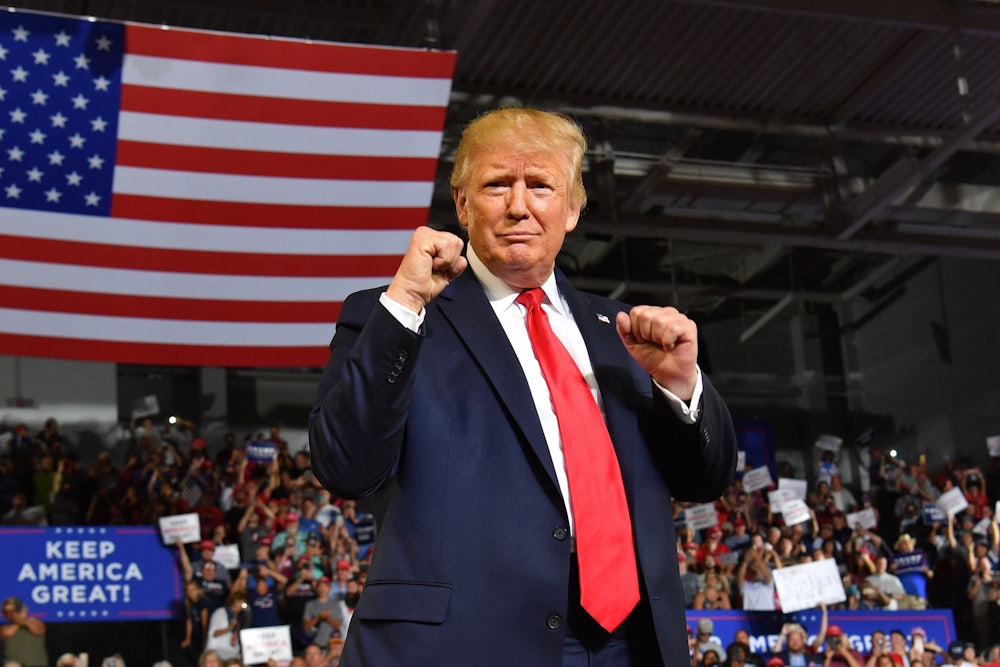The idea that Donald Trump plays “3D chess” has never been particularly plausible; still, it was one of the most persistent themes of the 2016 election. The concept was (and is), to be fair, quite appealing: Trump’s public persona may appear, on the outside, to be a completely improvised and rarely coherent mess, but, on the inside, everything is well oiled and well organized, brilliantly conceived to play outside the lines and win seemingly impossible victories.
The fact that Trump did end up winning the presidency made this theory even harder to kill. It was helped along by reporters and pundits, who used it to explain why they’d so badly misinterpreted the events leading up to the election. The chess meme was armor for prognosticators, proof that they got things wrong because Trump was a secret genius—not because they were, in fact, public fools. Since 2016, however, if the trope hasn’t exactly died, it’s yielded to an even simpler reality. In this White House, it has become impossible to ignore the fact that President Trump really doesn’t have any idea what he is doing. He is making it all up as he goes along.
But, the 3-D chess storyline rose from the dead this past week. On Sunday, the president sent out a series of vile, racist tweets aimed at four freshman Democrats in the House of Representatives—all women of color—known collectively as “The Squad.” These tweets may have been especially vivid, but they communicated what has been clear for years. As Jack O’Donnell, who worked with Trump in Atlantic City told The New York Times, “White people are Americans to Trump; everyone else is from somewhere else.”
By Tuesday, many news outlets again began asking the same tediously familiar questions: Was the president just being an unhinged racist when he tweeted that four American citizens should “go back” to where they “came from?” Or was he executing a calculated piece of political strategy, the centerpiece of an orchestrated and savvy re-election campaign that will propel Trump to a second term in office?
Democratic strategist David Axelrod tweeted that the president “wants to raise the profile of his targets, drive Dems to defend them and make them emblematic of the entire party. It’s a cold, hard strategy.” CNN’s Jake Tapper surfaced an old quote from Steve Bannon, suggesting that Democrats always lose when they call out racism. The New York Times’s Frank Bruni, meanwhile, argued that Trump was trying to reframe the election, making it not against the eventual Democratic nominee, but against The Squad. “Against who they are individually. Against what they represent ideologically. Against what they telegraph about the demographic direction of the country and about a new distribution—a new sharing—of power,” Bruni wrote. Axios’ Mike Allen, meanwhile, reported that while “it might seem like improvisational madness when President Trump tells American citizens in Congress to ‘go back’ where they came from ... those close to Trump say there’s a lot of calculation behind his race-baiting.” Trump, Allen reminded us, won older white voters by substantial margins, and he “watches Fox News and knows AOC, in particular, is catnip to old, white voters, especially men.”
“She is young, Hispanic, female and a democratic socialist—a 4-for-4 grievance magnet,” penned Allen.
The argument here is that racism benefits Trump politically because it motivates his base, and because it forces Democrats to defend high-profile, left-of-center people of color, which further motivates his base. “Trump is proposing a giant swap: Republicans can no longer count on suburban women and we will continue to lose college-educated men and women, while we increasingly pick up working white Americans without college degrees,” former White House press secretary Ari Fleischer told The Washington Post. “Nobody knows who will come out ahead in the swap.”
It’s true that Trump’s support among Republicans has ticked up slightly in the wake of his tweets. But it’s also declined among independents. No one should ever take Fleischer at his word, but it’s worth noting that Trump basically rolled out this exact strategy during the 2018 midterms. In the final weeks of the campaign, Trump used rallies, Twitter, and his bully pulpit to fearmonger about undocumented immigrants and a migrant “caravan” approaching the southern border. As a result, Republicans lost across the country, and in historic fashion. Yes, there were a few victories in battleground districts, but overall, there were signs that this racist, divisive message wasn’t playing in states the president must win if he wants to be reelected—states like Wisconsin, Michigan, and Pennsylvania.
Go back even further, and there are more problems with this multidimensional “analysis.” While Trump won blue-collar white voters who rated immigration as a significant problem—and did so by large margins in 2016—the advantage came, in part, from wedding his nativist message to an economic one that included free trade and a full-throated defense of Medicare and Social Security. Now that he’s president, however, Trump’s trade policies have received (at best) mixed ratings from many of these same voters. And, given his administration’s approach to entitlements, the president will not be able to credibly make the same case for Medicare and Social Security. That hasn’t stopped him from making empty claims before, but it does suggest that Trump might need to offer more than just unadulterated racism to win in 2020.
Looking at his short list of accomplishments, however, that’s basically all he has. He will undoubtedly run one of the most grotesque reelection campaigns of the post–civil rights era, but that is not to say that this week has been a preview of a deft, grand strategy. Instead, this was a confirmation of what’s been evident for the past several years, and what’s been known to Trump watchers for decades: The president is a bigot—maybe a lucky one, but a bigot all the same.
